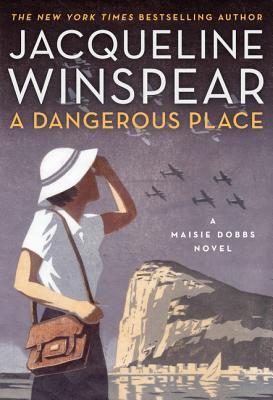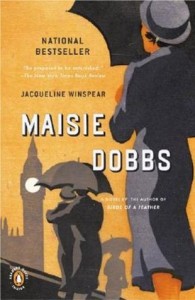 Format read: ebook provided by the publisher via Edelweiss
Format read: ebook provided by the publisher via EdelweissFormats available: hardcover ebook, audiobook, large print
Genre: historical mystery
Series: Maisie Dobbs #11
Length: 352 pages
Publisher: Harper
Date Released: March 17, 2015
Purchasing Info: Author’s Website, Publisher’s Website, Goodreads, Amazon, Barnes & Noble, Kobo, Book Depository
Maisie Dobbs returns in a powerful story of political intrigue and personal tragedy: a brutal murder in the British garrison town of Gilbraltar leads the investigator into a web of lies, deceit and danger
Spring 1937. In the four years since she left England, Maisie Dobbs has experienced love, contentment, stability—and the deepest tragedy a woman can endure. Now, all she wants is the peace she believes she might find by returning to India. But her sojourn in the hills of Darjeeling is cut short when her stepmother summons her home to England; her aging father Frankie Dobbs is not getting any younger.
But on a ship bound for England, Maisie realizes she isn’t ready to return. Against the wishes of the captain who warns her, “You will be alone in a most dangerous place,” she disembarks in Gibraltar. Though she is on her own, Maisie is far from alone: the British garrison town is teeming with refugees fleeing a brutal civil war across the border in Spain.
Yet the danger is very real. Days after Maisie’s arrival, a photographer and member of Gibraltar’s Sephardic Jewish community, Sebastian Babayoff, is murdered, and Maisie becomes entangled in the case, drawing the attention of the British Secret Service. Under the suspicious eye of a British agent, Maisie is pulled deeper into political intrigue on “the Rock”—arguably Britain’s most important strategic territory—and renews an uneasy acquaintance in the process. At a crossroads between her past and her future, Maisie must choose a direction, knowing that England is, for her, an equally dangerous place, but in quite a different way.
My Review:
 Compared to how much I loved the two other books in the Maisie Dobbs series that I have read, Maisie Dobbs (reviewed here) and Leaving Everything Most Loved (reviewed here), I have some very mixed feelings about A Dangerous Place.
Compared to how much I loved the two other books in the Maisie Dobbs series that I have read, Maisie Dobbs (reviewed here) and Leaving Everything Most Loved (reviewed here), I have some very mixed feelings about A Dangerous Place.
It certainly is dangerous – Maisie is in Gibraltar in 1937, during the Spanish Civil War. While the war did not touch Gibraltar directly, refugees fled into or through the city every day. Sometimes a trickle, sometimes in droves. The British officialdom at this normally quiet and tiny outpost of the Empire was officially overwhelmed.
And Maisie throws herself into the middle of the mess, because it is preferable to throwing herself into the arms of death, one way or another. At the end of her rope, she finds purpose again in Gibraltar by going back to her own beginnings, at least professionally.
Why is Maisie so close to self-destruction? That’s the hard part of this story. It has been four years since the end of Leaving Everything Most Loved, and in that intervening period, Maisie has been surprisingly happily married, pregnant, miscarried and widowed. All those harrowing events are dealt with in a series of letters that form the first chapter of the book.
Maisie spends the entire rest of the story dealing with her overwhelming grief while trying to put the pieces of her life back together. It is a harrowing chain of events, and Maisie is still not past them enough to even function. She is on her way back to England from India when she realizes that she cannot yet bear the thought of seeing all the places that she and James knew together, so she disembarks at Gibraltar in order to prevent being overcome by her own depression.
Only Maisie could find a dead body under these circumstances, but find one she does. And slowly, reluctantly, Maisie takes on the unofficial case of determining how and why Sebastian Babayoff really died. Was he just a victim of a desperate refugee and unfortunate circumstances? Or, as Maisie begins to suspect was Babayoff murdered because he was a young, foolish and occasionally intrepid photographer who took the right picture at the very much wrong time.
As Maisie investigates, she begins her return to the practices that her mentor Maurice Blanche instilled in her before she fell in love with James or even thought that she might marry someday. Taking up the threads of her old profession helps her to root herself back into the person she was before tragedy struck her life. She is keen to hunt down the truth, and to befuddle the agents of the British Secret Service who are tailing her, seemingly at the request of her father-in-law and for her own good.
Maisie has never had much truck with people who attempt to do things for her supposed own good, especially when they neglect to consult her about what that good might be. But she still feels herded and manipulated at every turn.
With good reason – the Secret Service is attempting to herd her towards a conclusion of their making. In the end, Maisie understands much, but does not completely condone their reasoning.
And at last she finds a purpose that she can believe in again for herself. So she gives everyone the slip and returns to a profession in which she can do the greatest good, and hopefully find her way back to a self that can carry on.
Escape Rating B+: As I said at the beginning, A Dangerous Place gave me a lot of mixed feelings. That being said, I still love Maisie herself and I remain very interested in her journey.
However, I found the way that the author dealt with the tumultuous years between Leaving Everything Most Loved and A Dangerous Place left me feeling a bit short-changed. While I realize that the Maisie Dobbs series is mostly about Maisie’s cases and not about Maisie’s love life, events that cause so many profound changes and her and her circumstances deserve more than a few letters.
I would love to have seen a book where Maisie solves a case in Canada during the time of her marriage that allowed the author to cover the tragedies and still tell a Maisie story. I like Maisie and wanted to be there for her and with her. I say this fully recognizing that this is the author’s series and not mine and that it is up to her to write the books her way. But I missed the sense of following along with Maisie during those four eventful years.
And because we weren’t with Maisie, we see her grief at second hand, instead of being in there with her. She talks about it and feels it (and occasionally takes morphine for it) but we are standing outside it and wondering when she is going to pick herself and get on with things. Because the Maisie we know and often love is a person who gets on with things no matter what.
The circumstances in Gibraltar are incredibly murky. History tells us that the Spanish Civil War was a proxy war for the Great Powers before the start of World War II. And even though we know that Britain’s policy in the Chamberlain years was to appease Nazi Germany at all costs, it is hard to see those costs being weighed up in lives lost and villages destroyed.

The bombing of the Spanish/Basque village of Guernica that drives so many people to action in the story was immortalized in a famous painting by Pablo Picasso, also titled Guernica. The world tour of the painting brought the attention of the world to the Spanish Civil War, just as the action itself brings the war home to so many people in the story.
But Maisie spends a lot of the time in A Dangerous Place muddled and confused. While taking on Sebastian Babayoff’s case brings her out of herself and out of her depression, she has a difficult time picking her way through the loose threads and the dangling red herrings placed in her way by the British Secret Service. Her confusion becomes ours, and in the end Babayoff himself is lost. We have come to expect more from Maisie.
The ending of the case is not satisfying. The ends have been forced to justify the means by the exigencies of an empire that is fading. What does satisfy is the way that Maisie takes charge of her own life at the end, even if she has to run away again in order to achieve it.
I am looking forward to more of Maisie’s adventures. Now that the Secret Service has her fixed in their sights, I expect her to do some very interesting and hush hush work for the Government in the impending war.

